Cuba Strengthens Regional Ties | Cuba fortalece lazos con su región sin descuidar su frente norte
By Patricia Grogg
IPS
English | Spanish
HAVANA – With the recently-created Community of Latin American and Caribbean States (CELAC), Cuba is strengthening its regional reinsertion, while progress towards normal ties with the United States would appear to remain a distant prospect, and the return of the right-wing Popular Party to power in Spain could reopen tensions on that front.
On Wednesday, President Raúl Castro demonstrated the importance put on regional integration by travelling to Trinidad and Tobago to participate in the fourth Cuba-CARICOM (Caribbean Community) summit, a mechanism for political exchange and cooperation that was officially created on Dec. 8, 2002 during a meeting in Havana.
Cuba has diplomatic ties with CARICOM’s 14 members: Antigua and Barbuda, Bahamas, Barbados, Belize, Dominica, Grenada, Guyana, Haiti, Jamaica, Montserrat, Saint Kitts and Nevis, Saint Lucia, Saint Vincent and the Grenadines, Suriname, and Trinidad and Tobago.
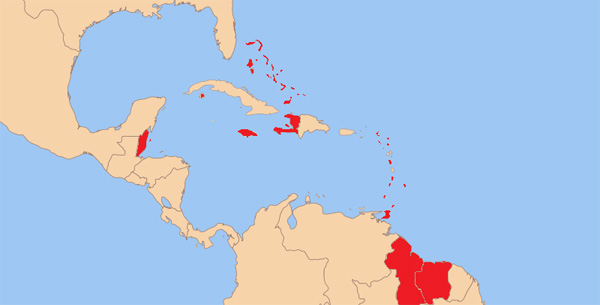 In announcing this latest trip by Castro, the second in less than a week, the official Granma newspaper described these meetings as “scenarios of reflection and decision- making at the highest level for deepening and strengthening relations of cooperation and solidarity.”
In announcing this latest trip by Castro, the second in less than a week, the official Granma newspaper described these meetings as “scenarios of reflection and decision- making at the highest level for deepening and strengthening relations of cooperation and solidarity.”
“At a time when the region is advancing toward new and higher forms of integration, CARICOM, established on the basis of relations of friendship and respect among its members, has accumulated organisational and working experience that can be used in the process of consolidating and strengthening”
the brand-new CELAC bloc, the Granma article said.
For the Cuban president, CELAC’s main advantage is its independence from the United States; moreover, it reflects
“the concept of a united and sovereign region, committed to a common destiny,”
as he emphasised during a Dec. 2-3 presidential summit in Venezuela, where the new bloc was officially launched.
However, experts warn that if the new organisation attempts to enter into any conflicts with the United States or replace the Organisation of American States (OAS), it is doomed, because many nations in the region would be opposed to such a move, including the Chilean government of Sebastián Piñera, which holds the rotating presidency of CELAC until 2012.
In any case, Castro does not seem to be unaware of these differences.
“We do not have fully homogenous views, nor do we agree on all political positions. That is part of the reality, and taking that into account, we have to work in a climate of respect and cooperation,”
he said in his speech in Caracas.
CELAC includes 33 nations in Latin America and the Caribbean, home to a total population of 580 million.
Although the region has significant natural resources and has posted strong economic growth in recent years, there are serious inequalities in the distribution of wealth, with 174 million people living in poverty.
In June 2009, the OAS decided by consensus to overturn a 1962 resolution that kept Cuba out of the hemispheric organisation. But the Castro government refused to return, announcing that instead it wanted to strengthen, expand and harmonise representative integration mechanisms in the region, including all of the Caribbean islands.
The Cuban president travelled to Caracas after meeting in Havana with Michael Kinnamon, general secretary of the National Council of Churches of Christ in the United States, an organisation which, according to the cleric, represents some 50 million parishioners. Other sources consulted by IPS said the organisation has influence in the ruling Democratic Party.
In a press conference shortly before returning to the United States, Kinnamon said that Cuban authorities were willing to work for a normalisation of relations with Washington on the basis of mutual respect.
“The hardest problem is how to reach that process,”
he said, noting that no major policy changes could be expected because of the 2012 elections in the U.S.
During his Nov. 28-Dec. 2 visit to Havana, Kinnamon met with relatives of the five Cuban agents held in U.S. prisons and with Alan Gross, a U.S. citizen serving 15 years in prison in Cuba, charged with involvement in subversive plans against the island.
Both cases are obstacles to any progress toward rapprochement between the two countries, divided by five decades of political and ideological conflict. Washington is demanding Gross’s unconditional release, and Havana, which says the sentences handed down to the five Cubans are unjust, wants a presidential pardon for them.
“A humanitarian solution both for Gross’s situation and for the Five would surely open the doors to the process of a normalisation of relations. Somebody just needs to decide to take the first step,”
Marcial Hernández, president of the Cuban Council of Churches, commented to IPS.
René González, who completed his sentence but is on parole in the U.S. for three years and cannot return to Cuba, along with Antonio Guerrero, Ramón Labañino, Fernando González and Gerardo Hernández asserted during their trial that their actions were aimed at preventing terrorist actions by violent Cuban exile groups in Miami.
In a joint statement, both the Cuban and U.S. religious groups promised to work for a solution to these cases and for an end to the five-decade embargo. The U.S. sanctions were opposed this year, for the 20th time, by the United Nations General Assembly.
“A half century of animosity between our two countries should end,”
the joint statement said.
Meanwhile, the victory of the right-wing Popular Party in Spain’s recent presidential elections is leading to predictions of changes in Havana-Madrid relations, following a period of rapprochement promoted by socialist Prime Minister José Luis Rodríguez Zapatero, whose outgoing administration restored dialogue and cooperation with Cuba.
Unhappy with that approach, Cuban dissidents hope Spanish prime minister-elect Mariano Rajoy will give more attention and support to internal opposition groups in Cuba, which could cause friction at the government level. Nonetheless, some experts say that both Rajoy and Castro now have other priorities, and do not forecast turbulent relations.
Source: IPS
Caricom to US: End Cuba embargo
By Anna Ramdass
Trinidad Express
Caricom chairman Dr Denzil Douglas yesterday called on the United States Government to immediately end the trade embargo imposed against Cuba.
Douglas, also the St Kitts Prime Minister, was speaking at the opening ceremony of the IV Caricom/Cuba Summit at the National Academy for the Performing Arts (NAPA) in Port of Spain.
He stressed on the positives of the Caricom-Cuba relationship which he said have remained robust and survived an ever changing hemispheric and international geopolitical environment.
As small states with limited resources, Douglas said it was imperative efforts are pooled and countries stand behind common principles in order to advance their objectives.
These principles, he said, include adherence to the Untied Nations Charter and for this region in particular adherence to the principles of the self determination of peoples, of non-interference in the internal affairs of States and of upholding the rule of international law.
“It is in keeping with these principles that Caricom has remained resolute in its camaraderie with Cuba and in its firm stance of calling for an end to the economic, commercial and financial embargo of the Republic of Cuba,” said Douglas.
“Caricom therefore takes this opportunity of this Summit to again urge the Government of the United States of America to heed the overwhelming call of the members of the United Nations to lift with immediate effect, the unjust economic, commercial and financial embargo imposed against the Republic of Cuba,” he added.
In her address, Prime Minister Kamla Persad-Bissessar said Caricom must work assiduously to breathe new life into the Caricom-Cuba Joint Commission.
The mandate of the Commission, she said, was to promote technical co-operation, human resource development, disaster management, meteorology, tourism and trade, but it has not met since 2005.
Persad-Bissessar said the importance of solidarity between Caricom and Cuba has brought about a stronger role for groupings such as the Group of Latin American and Caribbean States (GRULAC) at the UN.
Caricom, she said, was resolute in its support of Cuba’s candidature for membership of the United Nations Human Rights Council at the first elections in 2006, and again for re-election in 2009 despite vigorous attempts by others to frustrate the candidature.
Persad-Bissessar noted that all Caricom members have voted consistently in favour of the annual UN General Assembly Resolution which calls for an end to the trade embargo and blockade of Cuba.
She said this was no different in October this year when 186 States voted in support of the resolution with two against, and three abstentions.
“Once again Caricom demonstrated its commitment to the principles underlying resolutions adopted by the General Assembly of the world’s premier multilateral institution,” she said.
Source: Trinidad Express
Por Patricia Grogg
IPS
inglés | español
LA HABANA, 7 dic (IPS) – Con la flamante Comunidad de Estados Latinoamericanos y Caribeños (Celac), Cuba fortalece su inserción regional, mientras la vuelta a una relación normal con Estados Unidos es cada vez más lejana y podrían reaparecer las tensiones con España tras el regreso de la derecha al gobierno de ese país.
El presidente de Cuba, Raúl Castro, remarcó este miércoles 7 esa prioridad de la diplomacia cubana al viajar a Trinidad Tobago para participar en la IV Cumbre de la Comunidad Caribeña y su país (Caricom-Cuba), un mecanismo de intercambio político y cooperación creado oficialmente el 8 de diciembre del 2002 en un encuentro en La Habana.
Cuba mantiene actualmente relaciones diplomáticas con todos los países integrantes de la Caricom, que son Antigua y Barbuda, Bahamas, Barbados, Belice, Dominica, Granada, Guyana, Haití, Montserrat, San Cristóbal y Nevis, Santa Lucía, San Vicente y las Granadinas, Suriname, y Trinidad y Tobago.
 Al anunciar el nuevo viaje de Castro, el segundo en menos de una semana, el diario oficial Granma describió estos encuentros como un escenario de reflexión y toma de decisiones al máximo nivel para la profundización y fortalecimiento de las relaciones de cooperación y solidaridad.
Al anunciar el nuevo viaje de Castro, el segundo en menos de una semana, el diario oficial Granma describió estos encuentros como un escenario de reflexión y toma de decisiones al máximo nivel para la profundización y fortalecimiento de las relaciones de cooperación y solidaridad.
“En momentos en que la región avanza hacia nuevas y superiores formas de integración, la Caricom, asentada en las relaciones de amistad y respeto entre sus miembros, acumula una experiencia organizativa y de trabajo que puede ser aprovechada en el proceso de consolidación y fortalecimiento”
de la naciente Celac, consideró.
Para el gobernante cubano, la principal ventaja de la Celac está en su independencia de Estados Unidos, además de que consolida
“el concepto de una región unida y soberana, comprometida con un destino común”,
según resaltó en la cumbre que creó este bloque del viernes 2 y el sábado 3 en Venezuela.
Sin embargo, expertos alertan que, si la naciente organización pretende entrar en conflicto con el vecino del norte y sustituir a la Organización de los Estados Americanos (OEA), le espera el fracaso, pues se opondrían varias naciones de la región. Las fuentes mencionan en esta actitud al gobierno chileno de Sebastián Piñera, quien asumió la presidencia temporal del Celac hasta 2012.
En todo caso, Castro no parece ajeno a tales diferencias.
“No tenemos un ideario plenamente homogéneo, ni coincidimos en todas las posiciones políticas. Esa es parte de la realidad y con ella debemos trabajar en un clima de respeto y cooperación”,
dijo el mandatario cubano en su discurso en Caracas, difundido íntegramente por medios de prensa de esta isla.
La Celac agrupa a 33 naciones de América Latina y el Caribe, donde viven más de 580 millones de habitantes. La región posee importantes recursos naturales y buenos índices de crecimiento, pero exhibe graves desigualdades en la distribución de la riqueza y cerrará este año con 174 millones de pobres.
En junio de 2009, la OEA aprobó por consenso derogar la resolución de 1962 que mantiene a Cuba suspendida del foro continental, pero el gobierno de Castro rechazó regresar y anunció su opción de fortalecer, expandir y armonizar los mecanismos de integración representativos de la región, incluyendo todo el Caribe insular.
Castro viajó a Caracas tras entrevistarse en La Habana con Michael Kinnamon, secretario general del Consejo de Iglesias de Cristo en Estados Unidos, una organización que según el líder religioso agrupa a unos 50 millones de personas en la potencia norteña. Otras fuentes consultadas por IPS añadieron que la entidad tiene influencia sobre el gobernante Partido Demócrata.
En conferencia de prensa poco antes de emprender el regreso, Kinnamon dijo que las autoridades cubanas estaban dispuestas a trabajar por la normalización de relaciones con Washington, sobre la base del mutuo respeto.
“El grave problema es cómo llegar a ese proceso”,
dijo el religioso, quien recordó que por el período electoral en su país no pueden esperarse grandes cambios de política.
En su visita del 28 de noviembre al 2 de diciembre a La Habana, Kinnamon conversó con familiares de los cinco agentes cubanos presos en Estados Unidos y con Alan Gross, un ciudadano también de ese país condenado a 15 años de prisión en Cuba, acusado de implementar planes subversivos contra este país.
Ambos casos dificultan actualmente cualquier avance hacia el acercamiento entre las dos naciones separadas por un conflicto político ideológico de cinco décadas. Washington exige la excarcelación sin condiciones de Gross, y La Habana, que considera injustas las sentencias dictadas contra los cinco compatriotas, pide para ellos el indulto del presidente Barack Obama.
“Una solución humanitaria tanto para la situación de Gross como de los cinco abriría con toda seguridad las puertas hacia el proceso de normalización de relaciones. Solo hace falta que alguien decida dar el primer paso”,
comentó a IPS el presidente del Consejo de Iglesias de Cuba, Marcial Hernández.
René González, quien cumplió su condena pero la justicia estadounidense le adicionó tres años de libertad vigilada que le impiden regresar a Cuba, Antonio Guerrero, Ramón Labañino, Fernando González y Gerardo Hernández alegaron en el juicio que sus acciones estaban dirigidas a evitar actividades terroristas de grupos violentos del exilio cubano en Miami.
En una declaración conjunta, ambas instituciones religiosas se comprometieron a trabajar por una solución para esos casos y el cese del embargo, rechazado este año por vigésima ocasión en la Organización de las Naciones Unidas (ONU).
“Medio siglo de animosidad entre nuestros dos países debe terminar”, afirmaron.
En tanto, el resultado a favor del derechista Partido Popular en las elecciones anticipadas de España hace prever cambios en las relaciones de ese país con esta isla.
Los vínculos entre Madrid y La Habana estaban en un gran momento tras el período de acercamiento propiciado por el socialista José Luis Rodríguez Zapatero, cuyo saliente gobierno restableció el diálogo y la cooperación con esta nación caribeña.
Descontenta con esa postura, la disidencia interna aspira a que el futuro presidente del gobierno de España, Mariano Rajoy, preste más atención y sobre todo apoyo a los grupos opositores, lo cual podría ser motivo de fricciones con la administración de Castro.
Sin embargo, algunos estudiosos conjeturan que tanto Rajoy como Castro tienen por ahora otras prioridades y no vaticinan relaciones tormentosas.
Fuente: IPS

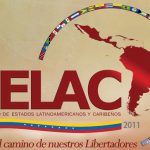
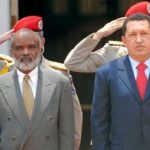

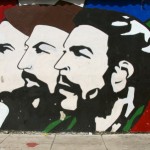

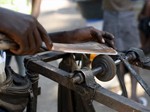
Comments
Cuba Strengthens Regional Ties | Cuba fortalece lazos con su región sin descuidar su frente norte — No Comments